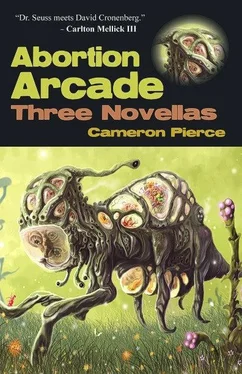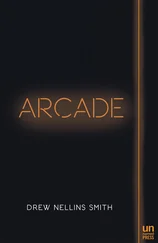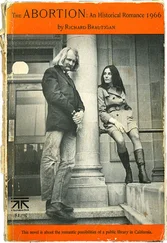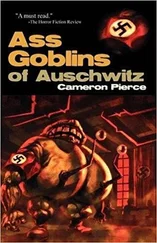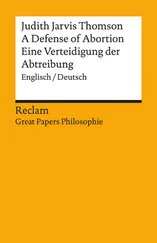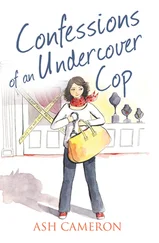“The monthly installment form is in my office. If you take it with you, it’ll save me a stamp.”
“If it means that much.”
“It does.”
The accountant springs up from the foldout chair, knocking it to the ground as she charges for the door.
Simon picks up the fallen chair and hurries after her.
He has to sprint to keep up. He feels awkward and unbalanced, hustling down the stone path with one arm taped to his side.
About a hundred yards behind the trailer, they come upon another trailer. The accountant goes inside and Simon follows. Except for a white desk, three foldout chairs, and several rusting file cabinets, the trailer is bare.
“Sit down,” the accountant says.
Simon collapses in a chair and rests his forehead on the edge of the desk. He is breathless. His side aches.
The accountant opens a file cabinet and removes a green document. She sits across the desk from him, studying the document. “You have twelve months from today to pay for all funeral expenses, including interest,” she says, sliding the form across the desk.
Simon sits up. He creases the form down the middle and stuffs it into his inner breast pocket.
“Anything else?”
“Give me your hand,” the accountant says.
Simon places his right hand palm-up on the desk.
“The other hand.”
“I can’t. I taped my left arm to my side.”
“Why would you do such a thing?”
“It was acting up.”
“Let me look at it. Maybe I can help.”
“It won’t move.”
The accountant comes around the desk and stops behind Simon. She puts her hands on his shoulders. “Let me look.”
Simon shrugs. He is too confused to resist. Plus, maybe if he lets the accountant look at his arm, she’ll take pity and reduce the amount owed for the funeral.
She removes his jacket and rolls up the left sleeve of his shirt. She tears off a piece of electrical tape. Simon flinches. Hair and skin come away with the tape, but the pain does not alert his left arm into action.
The accountant lifts his left arm and lays Simon’s hand palm-up on the desk. She reaches above him, grabs the withered string that used to be attached to his left hand, and returns to her side of the desk. She opens a drawer, comes up with a little sewing kit, and removes a needle and blue thread. Simon is too shocked to get up and run out of the trailer.
“Be still and don’t speak,” the accountant says.
“But how can you—”
“I said shut up.”
Simon obeys.
The accountant grips his left hand string between her teeth while she threads the needle. After the needle is threaded, she loops it in and out of the severed end of his left hand string.
She lowers the string to the center of his left palm.
“This might hurt, but it won’t take long,” she says.
She weaves the needle in and out of his palm. Every time the needle enters his hand, it feels like a tattoo gun being pushed too deep. But she’s right, it doesn’t take long. As soon as his string is sewn back to his hand, she bites and ties the thread, and returns the thread and needle to the sewing kit.
Simon digs his fingers into his palm.
He can move his left arm again.
Although the funeral just ended, he suddenly feels very excited.
He leaps out of his chair and says, “You see them too.”
He has so many questions for her.
“Get out,” she says. “I have much work left to do. Your business here is done. If you have any questions about the monthly payment plan, Johnston Funeral Services has an auto mated telephone system.”
“What about the strings? I have questions about the strings.”
The accountant points at the door and shouts, “Get out.”
“But—”
“I’ll call the police.”
Simon throws on his jacket and walks out the door. As he walks down the stone path, he hears some keys jangle behind him. He looks back without losing stride. The accountant is locking the door to her office. She must be scared or worried that he’ll return. He shrugs and sticks his hands in his pockets. At least he has his left arm back, and also confirmation that he’s not the only one who sees the strings. Maybe someday he’ll meet others. Maybe they’ll talk about it. Maybe he will tell the truth about Celia.
Maybe he will not.
It is his, this secret of the strings, of how he killed Celia and their unborn child. It is his secret.
Simon unlocks his bike from the FUNERAL PARKING ONLY sign. A parade of mourners crosses the parking lot.
Some of the people are wheezing and keeling over. As Simon walks past the mourners, an old man who looks like a walrus points at Simon’s bicycle and says, “How vulgar.
How dread fully vulgar.” None of the mourners have bikes with them. Biking to a funeral must be an improper thing to do. Simon lowers his head and continues on, ashamed.
He arrives at the main road and stops, allowing the last stragglers of the funeral march to pass before mounting his bike. The mountain is far steeper than it seemed on the way up. He feels nervous about riding down, so he takes a few minutes to admire the view, which he failed to notice during his ascent.
From the entrance of Johnston Funeral Services, he has a view of the entire city far below. It appears small and trapped, a pit of civilization surrounded by a plastic forest that swallows the horizon. The tinfoil bristling of the trees around him is ugly. He wishes the breeze would stop.
He has never biked down a mountain this steep. He might hurt himself. Maybe physical pain will distract him from the other pain. Considering the last few days, he’d welcome a broken bone. A smashed skull would be sublime. He’d lick gray matter from his lips and taste Celia.
He will not crash, although he likes to fantasize what would happen if he did. He just wants to go home. When he gets home, he will clean the apartment, take a hot shower and sleeping pills, and sleep for twelve hours. Then he can start making plans for the rest of his life.
He repositions his hands on the handlebars and kicks off. There’s no reason to pedal. He gains speed in no time at all. Every bump in the road vibrates through his entire body, his skinny bike absorbing none of the shock. The wind is deafening, like swallowing an ocean in each ear.
He’s moving faster than he feels comfortable moving. The wind stings his eyes and pries his mouth into a flapping smile. He’s crying, from the wind and from grief, but also from exhilaration.
A dark shape rolls into the road, directly into Simon’s path.Simon cannot use his brakes. He’s going too fast.
The dark shape stands and raises its hands above its head, urging Simon to stop. He can see it clearly now. The dark shape is a sloth.
He swerves to the right to dodge around the sloth while the sloth also moves to the right in a miscalculated attempt to avoid his bicycle. He tries to correct his move, but too late and too sharply. This could be fatal, he thinks.
He collides with the sloth.
The sloth acts more like a ramp than a road block, launching Simon off the side of the road.
The bike falls away from him. He is weightless and almost floating, then he’s falling after the bike, toward the bottom of a gulch so far fucking down it may as well be bottomless. Oh fuck stop falling, he thinks. Oh fuck stop falling, is all he can think.
He claws at the air out of desperation.
And he grabs onto something.
And he stops falling.
He’s hanging over the gulch by two of his own strings, suspended in midair. He grabbed the strings because they were the only thing he could touch. He should be dead right now. Instead, he swings in midair, hundreds of feet over fake trees and sharp rocks. The road is thirty feet away and maybe a hundred feet up.
Читать дальше
